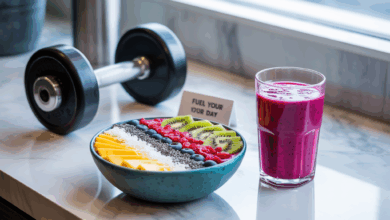Lower Abs Workout Tips: Proven Strategies for a Stronger Core

Ever caught yourself tugging at your waistband after sitting all day and thought, “If only my lower belly looked firmer”? You’re not alone. Whether you’re a busy parent, desk worker, or gym regular, getting the lower abdominal area to look and feel strong is a common challenge. These lower abs workout tips will give you practical, science-backed strategies to tighten your core without wasting time on ineffective moves.
Why the lower abs are so stubborn
The lower abdominal region tends to appear softer for three main reasons: fat distribution, posture and weak hip flexors. Many people also overemphasize cosmetic crunches and neglect total-body conditioning. Remember: visible abs come from a combination of muscle development, reduced subcutaneous fat, posture, and functional strength. That’s why this guide combines exercise variations, nutrition advice, and lifestyle tweaks.
Lower Abs Workout Tips: Practical advice and progressions
Below are targeted tips you can apply today. These cover technique, workout structure, and everyday habits that compound over time.
1. Prioritize core bracing over small, fast reps
Instead of rapid toe touches or uncontrolled leg swings, learn to brace your core. Imagine drawing your belly button toward your spine and exhaling slowly as you move. Controlled tempo (2–3 seconds on the eccentric, 1–2 seconds concentric) reduces momentum and increases muscle recruitment.
2. Start with pelvic tilt and dead bug progressions
If you’re new to core training or have low back pain, begin with pelvic tilts, the hollow hold, and dead bugs. These low-load exercises teach spinal stability and activate deep core muscles before adding leg-raising drills.
3. Use leg raises with bent-knee to straight-leg progression
Begin with bent-knee leg raises (reduce lever arm), then move to straight-leg raises and finally hanging leg raises. Focus on quality—slowly lower your legs to near the floor without letting your lower back arch.
4. Add anti-extension and anti-rotation moves
Planks, side planks, and Pallof presses build the ability to resist unwanted movement. These anti-extension and anti-rotation exercises are crucial for a functional, balanced midsection.
5. Combine strength with cardio for fat loss
Even the best lower abdominal exercises won’t reveal abs under a layer of fat. Include high-intensity interval training (HIIT) or steady-state cardio 2–4 times weekly, depending on your goals. Cardio increases calorie burn and improves insulin sensitivity, helping the body use fat as fuel.
6. Train the entire core, not just the lower abs
A complete core routine should include upper and lower rectus abdominis, obliques, and transverse abdominis work. Compound lifts like deadlifts or squats, when performed with proper bracing, are excellent for core development too.
7. Use progressive overload and track improvements
Increase difficulty over time by adding reps, sets, added weight (ankle weights or a medicine ball), or more difficult positions (from floor to hanging). Keep a simple training log to track progress—small, consistent gains add up.
8. Mind your breathing and hip flexor involvement
Many leg-raise variations recruit the hip flexors heavily. To emphasize lower abs, exhale during the lift and pause at the top. If your hip flexors take over, try bent-knee versions or shorter ranges of motion until your abs catch up.
9. Frequency and recovery
Train your core 3–4 times per week with a mix of intensity and recovery. Core muscles recover quickly, but they still respond best to varied stimulus and adequate sleep, hydration, and protein intake.
10. Be consistent and patient
Real-world results take weeks to months. Think small wins: better posture, fewer backaches, more stable lifting—these often appear before visible changes in body composition.
Sample lower-abs focused mini workout (10–15 minutes)
- Warm-up: 2 minutes of marching or light cardio
- Dead bug — 3 sets of 8–12 reps per side
- Bent-knee leg raises — 3 sets of 10–15 reps
- Plank with knee tuck (on sliders or towel) — 3 sets of 30–45 seconds
- Hanging knee raises (or captain’s chair) — 3 sets of 8–12 reps
- Cool down: hip flexor stretch and diaphragmatic breathing — 2–3 minutes
Nutrition and lifestyle tips that support lower abdominal definition
Exercise is one piece of the puzzle. Here are important non-exercise strategies:
- Maintain a moderate calorie deficit for fat loss—aim for 200–500 kcal/day reduction if weight loss is the goal.
- Prioritize protein (0.7–1g per lb of bodyweight) to preserve muscle while losing fat.
- Manage stress and sleep—high cortisol and poor sleep increase fat storage around the midsection.
- Increase NEAT (non-exercise activity thermogenesis): stand more, take walks on breaks, use stairs.
Real-world examples: how people fit lower abs work into busy lives
Case 1: Sarah, a graphic designer—She does a 10-minute core circuit before breakfast three days a week and swaps one TV hour for a brisk walk. Over 8 weeks she noticed better posture and a firmer midline.
Case 2: Marcus, a new dad—He uses nap time for two 8-minute HIIT sessions and practices plank progressions during diaper changes. Small, consistent efforts added up to improved core strength without long gym sessions.
Frequently Asked Questions
No. Spot reduction is a myth. You can strengthen the lower abs, but losing fat in that area requires overall body fat reduction through diet, cardio, and resistance training.
Aim for 3–4 focused core sessions per week, mixing intensity and exercise types. Integrate core bracing into compound lifts and daily activities for ongoing benefit.
Start with pelvic tilts, dead bugs, bent-knee leg raises, and planks. These build control and stability before progressing to hanging leg raises or weighted variations.
Conclusion — Take action on these lower abs workout tips
Lower abs workout tips are most effective when combined with consistent training, smart nutrition, and better daily habits. Start with the progressions above, track your workouts, and be patient—strength and visible changes come with time. Ready to build a stronger core? Try the 10–15 minute mini workout this week, and explore more structured workout routines or check our nutrition guides and wellness tips pages to support your journey.
Want a simple plan tailored to your schedule? Commit to one new habit this week—ten minutes of focused core work or swapping one snack for a higher-protein option—and notice the difference in four weeks.





